A new and unique year-long study of the pH level of the worlds polar oceans shows a marked difference between Arctic and Antarctic conditions.
The study showed that the Arctic ocean, for a variety of reasons, was far more vulnerable to climate change and acidification from the added C02 in the atmosphere as a result of burning of fossil fuels.
Helmuth Thomas is a professor at Dalhousie University’s Department of Oceanography in Halifax on Canada’s east coast. He is also hold the Canada Research Chair for Marine bio-geochemistry.
Listen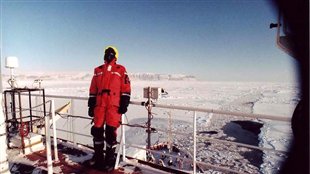
through the ice. © courtesy H Thomas
The study (published in Science Reports) was carried out by Dr Thomas and oceanography doctoral graduate Elizabeth Shadwick.
Dr Thomas noted that C02 and other greenhouse gases generated by events like volcanoes and forest fires are natural events having occurred over millenia, and nature has adapted quite well to them, but that human activity has added a great amount of C02 to the atmosphere and in a relatively short period.
Scientists have long noted that as we pump more C02 into the air, more is absorbed by the oceans, which turns them slightly acidic as the C02 in combination with the water becomes a mild form of carbonic acid.
As the water becomes more acidic, it becomes more difficult for marine life such as shell-fish to form their shells, and also weakens the shells as the acidic condition reduces the concentration of calcium carbonate, a key building block of seashells and other marine skeletons.
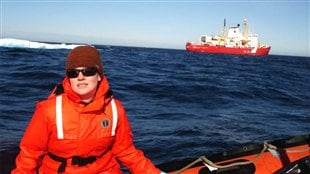
Shadwick aboard a zodia. © courtesy E Shadwick
This new study shows the Arctic is more acidic than the Antarctic and that it will become even more so and at a much faster rate than the Antarctic Ocean.
Their study noted differing conditions between the polar regions, with those conditions creating a greater propensity for the Arctic to become acidic more quickly.
The time scale to prevent massive biogeochemical changes to occur in polar regions is extremely short; only a very few decades in the Arctic. – Helmuth Thomas, Professor of Oceanography, Dalhousie University
One such difference was the higher freshwater content of the Arctic and the much greater variation in temperatures there. Between winter and summer conditions, water temperature could vary by up to 10 degrees, whereas in the Antarctic water temperature throughout the season remained almost constant throughout the year.
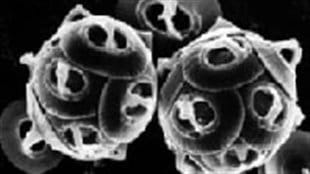
Gephyrocapsa oceanica under CO2 conditions of
today © ocean-acidification.net
Carbon dioxide absorbing phytoplankton also increase in the warmer summer and die off in the colder months in the Arctic even as the warmer summer water absorbs more carbon,
Because of the mixing of different oceans around the Antarctic, there were also more nutrients in the water than in the Arctic which may help to mitigate acidification there.
However, because of the fragile nature and “narrow windows” that enable life to exist in the polar oceans, even minute changes may have enormous affects.
What was also unique was the full-cycle year-long duration of the study. The research vessel Amundsen, remained frozen in the ice during the winter as the studies continued.
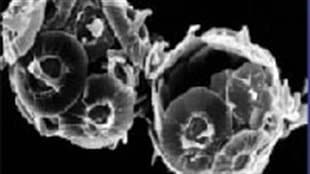
high C02 conditions predicted for the end of the
century © ocean-acidification.net
Up until this project, the Arctic and Southern Oceans remained under-studied at the annual scale compared to other oceans, with the majority of observations restricted to the less difficult and slightly less costly ice-free summer and autumn seasons.
Dr Thomas noted that the changes in the Arctic will occur rapidly, and “the time scale to prevent massive biogeochemical changes to occur in polar regions is extremely short; only a very few decades”
Because acidification will affect marine life such as tiny pteropods which are an important food source for fish, along with shell fish, both of which are important for marine animals higher up the food chain, including humans.
The expected changes in the polar oceans, especially the Arctic are likely to result in changes resulting in severe consequences for the polar ecosystem, and the region’s inhabitants.
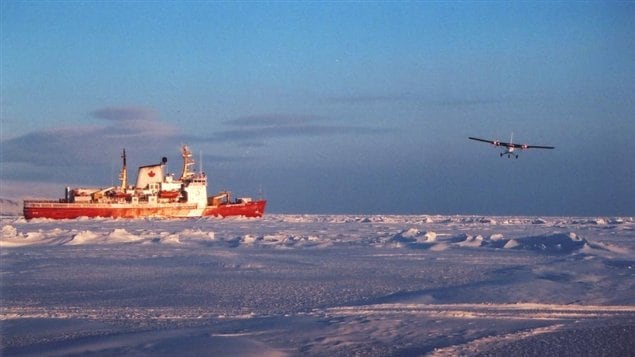






For reasons beyond our control, and for an undetermined period of time, our comment section is now closed. However, our social networks remain open to your contributions.